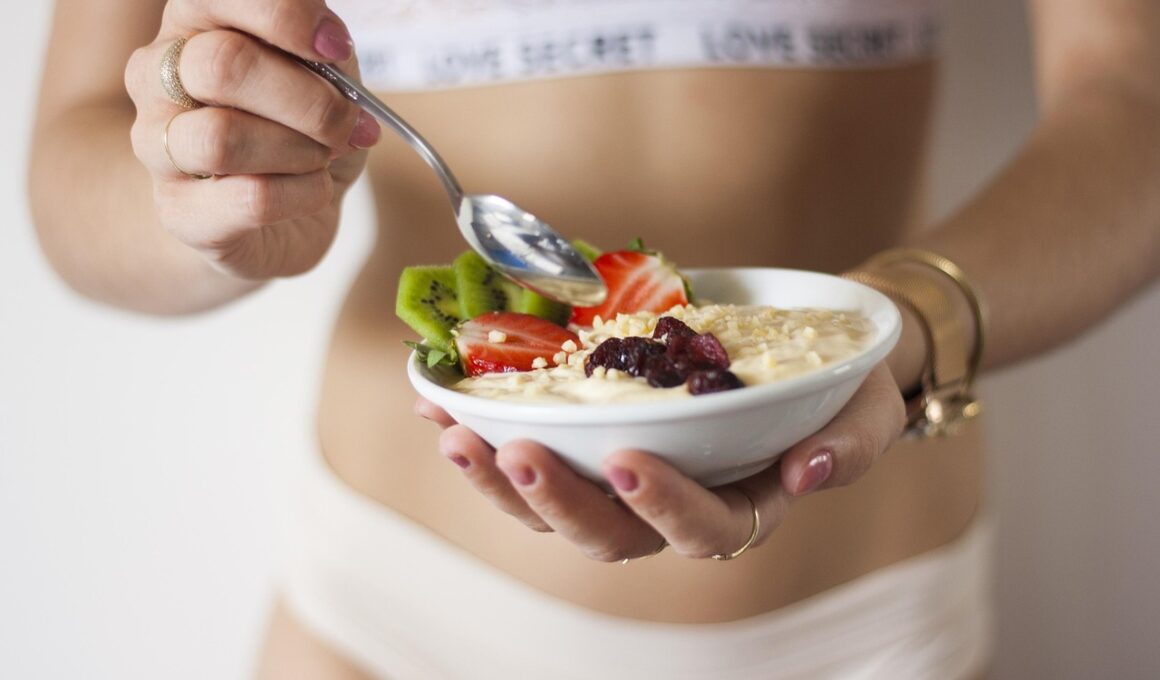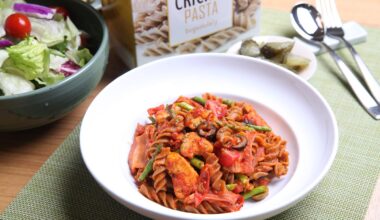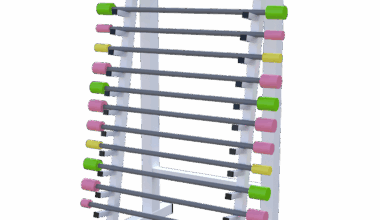The Role of Nutrition in Postpartum Core Recovery
Navigating through postpartum recovery can be a challenging journey, especially when it comes to rebuilding core strength. Appropriate nutrition plays a critical role in providing the essential nutrients that aid recovery. Whole foods rich in protein, vitamins, and minerals are key during this stage. Protein helps rebuild muscles while vitamins and minerals support overall bodily functions. After giving birth, new mothers should focus on a balanced diet that includes fruits, vegetables, healthy fats, and complex carbohydrates. Staying hydrated is equally important; water intake can influence recovery significantly. In particular, minerals such as calcium and magnesium are crucial for muscle function. When planning meals, consider incorporating antioxidants from berries, dark leafy greens, and colorful vegetables. Consistent nutrition habits can enhance mood, energy, and motivation, which are essential for maintaining an active lifestyle. Additionally, postpartum supplements might provide extra support as needed. Always consult with a healthcare provider or nutritionist to tailor a dietary plan that suits individual recovery needs. Engaging in this nutritional approach will lay a solid foundation for effective core strengthening and overall health during the postpartum period.
Once the foundation of nutrition is laid, understanding how nutrients interact with physical activity becomes essential. Engaging in core-strengthening exercises is crucial for regaining strength post-birth. Aim for exercises like pelvic tilts, bridges, and gentle abdominal contractions. Pairing these movements with a well-structured meal can optimize recovery. For instance, a post-exercise meal containing protein and carbohydrates can enhance recovery time significantly. Nutrient timing can help repair muscle and maintain energy levels as you progress with your workout regimen. On days designated for physical activity, focus on incorporating healthy snacks, such as a smoothie with spinach, banana, and protein powder. These foods can energize the body while also aiding in muscle repair. Additionally, omega-3 fatty acids found in fish, walnuts, and flaxseeds support anti-inflammatory processes, contributing to overall healing. Don’t underestimate the importance of good sleep and rest, as recovery doesn’t happen solely through nutrition and exercise. Hence, ensure you prioritize restorative practices, mindfulness, and take time for self-care. Your body has undergone a significant transformation, and nourishing it during this time is equally vital as the physical activities.
Specific Nutrients for Postpartum Healing
Various specific nutrients play a pivotal role in postpartum recovery, particularly in enhancing core strength. One of them is lean protein, found in poultry, fish, legumes, and dairy. Protein aids tissue repair, muscle recovery, and the production of important hormones responsible for regulating appetite and mood. For energy, focus on complex carbohydrates such as whole grains, beans, and sweet potatoes, as they provide slow-releasing energy. Incorporating fiber-rich foods will also support digestive health, which may be disrupted during the postpartum period. Essential fatty acids are crucial, particularly omega-3s, found in fatty fish and nuts. They can support cognitive health and potentially mitigate postpartum depression symptoms. Micronutrients such as iron, zinc, and vitamins A, C, D, and E hold substantial benefits; for example, vitamin D is essential for calcium absorption, impacting bone health essential for active mothers. Prenatal vitamins may still be useful during the postpartum phase. Always consult a healthcare provider before starting supplements. By understanding which nutrients specifically enhance recovery, postpartum women can better navigate their paths to regain strength and vitality more effectively.
Another layer of nutrition that helps in postpartum recovery is meal planning and preparation. Efficient meal prep can alleviate stress, ensuring availability of nutritious meals at all times. Consider planning a week’s worth of meals that encapsulate all necessary nutrients for recovery. For instance, batch-cooking protein-rich stews or soups can provide easy access to healthy options during hectic days. Additionally, prepping snacks such as yogurt, nuts, and pre-cut vegetables will help sustain energy levels. Investing in meal containers or digital meal planners may also help streamline this process. Using locally-sourced or seasonal ingredients can enhance meal quality and consequently recovery. Many new mothers find it challenging to cook while caring for a newborn; involving family members or friends can make this process more manageable. It is equally important to welcome support with your garden-fresh produce or to stock up on healthy food deliveries. Finding a support system during this transition is instrumental. With adequate nutrition and a well-structured meal plan, postpartum mothers can efficiently restore their core strength while caring for their newborns.
Hydration and Its Impact on Recovery
The importance of hydration cannot be overstated during postpartum recovery. Water is crucial for almost every bodily function and aids in digestion, nutrient absorption, and temperature regulation. During breastfeeding, the demand for hydration increases; thus, moms should aim to drink ample water throughout the day. Bring a reusable water bottle filled with hydrating beverages as a constant reminder to drink enough fluids. Herbal teas or infused waters can be enjoyable alternatives to plain water. Additionally, consuming water-dense fruits and vegetables such as cucumbers, oranges, and watermelon can contribute significantly to hydration levels. Dehydration can affect energy levels, mood, and even impede recovery. Supplements that aid hydration, including electrolyte powders, can support overall wellness postpartum, especially after physical activity or during hotter months. Listening to your body is crucial; thirst is a natural sign of needing hydration. Periodically assessing urine color can also provide insight into hydration levels. Encourage developing a habit of drinking water regularly and make it part of your daily routine. Staying well-hydrated nurtures both the body and mind as mothers embark on the postpartum fitness journey.
A fundamental component of core strengthening postpartum is understanding the connections between mental wellness and nutrition. Nutrition profoundly influences mood and energy levels, which significantly impacts motivation for physical activity. Incorporating foods rich in B-vitamins, such as leafy greens, nuts, and whole grains, can assist in reducing feelings of fatigue and anxiety common in postpartum stages. Also, recognizing appetite patterns is essential. Not all mothers will feel hungry at the same times, and that’s entirely normal. Some may experience cravings while others may feel indifferent towards food. Maintaining flexibility in eating habits allows women to nourish themselves according to their needs. Mindful eating can enhance the relationship with food as mothers learn to appreciate every meal. Engaging fully in the perception of texture, taste, and enjoyment can enhance the satisfaction of meals. Furthermore, sharing meals with family can uplift spirits and foster connections as a crucial part of recovery. By addressing mental health and nutrition, postpartum women can focus on effective core recovery while fostering an overall sense of well-being.
Conclusion: The Holistic Approach
In conclusion, a holistic approach to postpartum recovery is the cornerstone for effective core strengthening. This encompasses a balanced focus on nutrition, hydration, rest, and physical activity. Each of these aspects supports the others, creating a synergistic effect on the body’s recovery process. Engaging in nourishing meals filled with essential nutrients not only contributes to physical strength but also enhances mental resilience, giving women the empowerment to navigate early motherhood. By planning meals thoughtfully and prioritizing hydration, mothers can form healthy habits that last well beyond the postpartum period. Adopting core-strengthening exercises can boost confidence and overall well-being in the body. Continuous support from healthcare professionals and family members provides motivation and guidance for mothers on this journey. A mother’s health significantly impacts her ability to nurture her child, making every aspect of her recovery crucial. As women embrace their postpartum journeys, they should remember to be kind to themselves, allowing for a timeline unique to their recovery and experiences. Therefore, integrating health and wellness practices from multiple disciplines leads to a fulfilling postpartum experience.
To further facilitate understanding, it’s beneficial to explore specific nutritious recipes that can support postpartum recovery. For instance, a quinoa salad loaded with colorful vegetables and a lemon-tahini dressing is not only refreshing but also nutrient-dense. Similarly, a breakfast smoothie made with spinach, banana, yogurt, and a scoop of protein powder can set a positive tone for the day. Preparing healthy snacks, such as energy balls made from oats, nut butter, and seeds, can provide convenient options amidst busy schedules. Also, consider enhancing meals with spices such as turmeric and ginger, which carry anti-inflammatory properties beneficial post-delivery. Meal kits and online resources seem helpful in building knowledge around creating wholesome, nutritious meals. Getting involved in local community supported agriculture (CSA) can also provide fresh produce. Utilizing what’s in season ensures the best nutrient quality and taste. As postpartum women implement these nutritional strategies, they pave the way for enhanced core recovery while establishing healthy eating patterns that can benefit their families. This lifelong knowledge serves as an excellent foundation for nurturing both themselves and their children.


